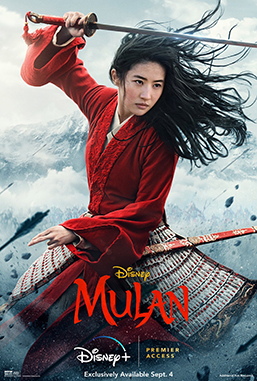Why Are People Boycotting Mulan?

October 2, 2020
Ever since its initial announcement to remake the 1998 Mulan into a live action in 2015, people have been skeptical of Disney’s decision to touch such a well known childhood favorite. As we got more information, we learned that this version would be a bit different than what most were probably hoping for. Disney was going to attempt to make this Mulan more accurate to the real life historical figure and less like the cartoon version of her.
Of course, this created a divide between Mulan fans who were not happy with the changes being made. Others were more agreeable with Disney’s attempt to represent China’s hero more accurately. As more news came out, we learned that fan-favorites like Mushu and Li Shang were going to be cut from the film in favor of making it more realistic. However, the addition of a new female villain who, ironically enough, had supernatural powers made many fans question Disney’s decisions.
With all of that said, these changes are not so horrible that Thai pro-democracy activists and other groups have spoken out and banded together to call for a global boycott. No, other problems surfaced that became much more serious and unavoidable.
In 2019, Liu Yifei, who stars as the Chinese heroine, voiced her support of the Hong Kong police in a social media post despite the ongoing protests and mistreatment of its citizens. Protests in Hong Kong broadened into a pro-democracy movement and demands for an investigation into police brutality. It sends a bad message that the character who represents freedom from oppression would in turn be played by an actress who has voiced support for an oppressor.
That isn’t the only thing, people have criticized Disney for not having any asian presence working behind the scenes. The director, cinematographer, music and casting director, and costume designer, etc. were occupations filled by non-asian people, in fact, they were mostly white. To some, this may not seem so bad. They might even say that it’s fine because the cast is majorly asian and that’s what matters right? Not exactly.
As critics had feared, it was confirmed by those who viewed the film that there were an abundance of historical inaccuracies in terms of costume design and many other aspects of cultural significance. Even if there were no inaccuracies, it is, in my opinion, the moral obligation of Disney to hire more people of Chinese descent to represent themselves in a highly anticipated film like this.
I asked my sister-in-law, Andrea, whether she thought that Disney should have hired more people of Chinese descent to work on a film that holds strong ties to the Chinese-American community and how, by not having that foundation, could this have affected the outcome of the movie. She said that, “it makes sense, I mean, if they’re supposed to be making a movie about a Chinese hero then maybe it would have been more thoughtful to have more Chinese people working on things that they would know more about. I would have to guess that having white people working on it is going to backfire on them.”
However, the most regrettable thing of all is that Disney was reported to have recorded a scene in Xinjiang, a site known to be on the same soil as that of one of China’s concentration camps. The Uighur people are not treated with respect or human dignity. China has detained more than 1 million Uighurs as part of a campaign of genocide that has gone largely unnoticed by the rest of the world. And Disney’s cooperation with China shows that in the most vile way.
The nail on the coffin, as one would say, is that in the credits of the movie, Disney offers China a formal thanks for allowing them to shoot scenes on their land. Understandably, many people have interpreted this as a colossal insult to the Uighur people.
I asked my sister-in-law again what she thought about Disney’s word of thanks to China for letting them shoot scenes near Xinjiang in the final credits of the movie and she said that, “That’s horrible. I mean, I knew a bit about the camps but I had no idea about them saying thank you to China for letting them be there.” This kind of response makes it worth it to spread the word, people are honestly willing to respond and learn about this.
This is why the Mulan 2020 movie has been publicly denounced by activists. Regular people like you and me should take care to know who exactly our money is supporting if we go and pay to watch this film, because it matters.
Citations
“Liu Yifei: Mulan Boycott Urged after Star Backs HK Police.” BBC News, BBC, 16 Aug. 2019, www.bbc.com/news/world-asia-china-49373276.